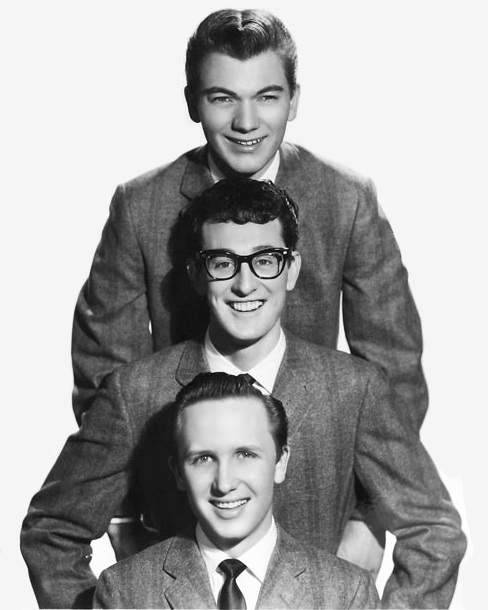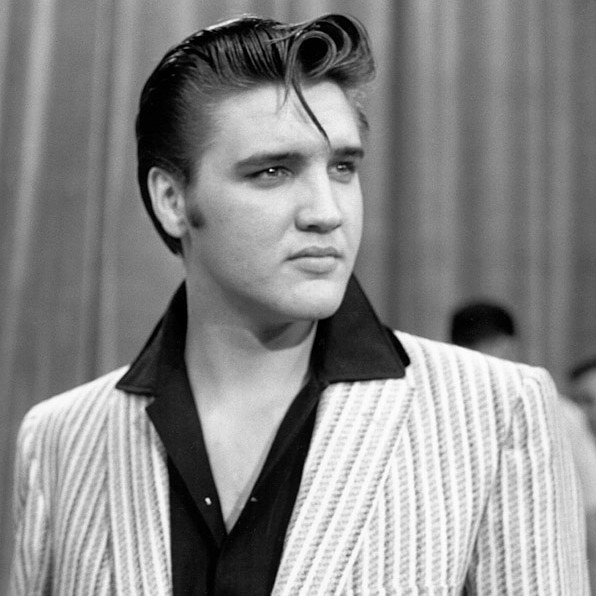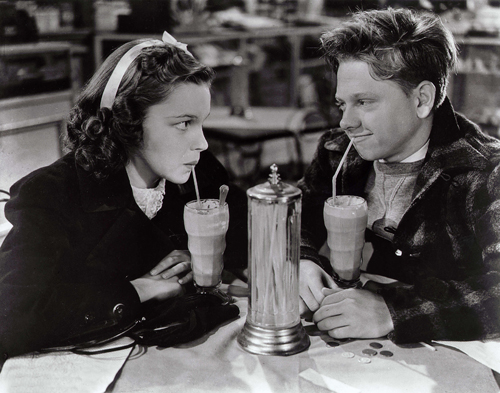I seriously did not intend for this to be as long as it became or even anything remotely resembling a full update, but fuck it; it's more shit for you guys to read. So the upgrade to chapter it gets.
 University of Tampa; Tampa, FL
Prof. Katz "K" Schmidt's History Classroom
January 13th, 2015
10:23 AM
University of Tampa; Tampa, FL
Prof. Katz "K" Schmidt's History Classroom
January 13th, 2015
10:23 AM
"But Professor K, do we have too review this material? Weren't we going to review the Wars in Africa today?"
"We'll get to that later Mr. Colton, but today we are going to delve into the matter of the media boom of the 1950's and how the arts of television, movies and music affected the United States and the West in general during the decade, turn to page 345 of your history book so we can begin students; okay? Okay"
=======
PART 23
The Effect of Media on Western Culture
"It was a huge risk to introduce the character of Louise like we did considering what was going on in the country and the tensions that were building, but it was the right thing to do that; and me and Mark know that still to this day
- Actress and Model Jeane Gifford on the introduction of African-American character "Louise Sanford" in the "Lady Jeane Show" during the 1950's; comments circa 1985
While we briefly delved into the effects that television and general media had on the Greater German Reich already, we haven't really delved much into the effects this had on the Western World; and this is a interesting topic to discuss. As media and what we see in our daily lives has a great effect on the consciousness of a populace and it's attitudes towards many pressing issues of the political and social sort, art forms have generally been throughout history a way for individuals to express themselves and push the boundaries that society has set for them; and has even caused great social change as a result from this pushing of the boundaries (as detailed in greater detail in Chapter 15 of your standard issue university history book). Thus because of this, I thought it was necessary that we delved at least briefly into the matter; as the effects the media can have on society can help you have a much greater understanding of history as a whole.
Figure 1: Rock n' Roll singer Walton Bishop (bottom) and his bandmates Buddy Holly (center) and Jerry Allison (top) posing for a photo in 1957.
While there was a great many change and evolution in nearly all forms of art and media during the 1950's, the most landscape changing of all of them would almost non-arguably have to have been the unexpected and since unprecedented rise of Rock n' Roll music to mainstream popularity throughout much of the West (and thus the subsequent fall of older more contemporary forms of music such as jazz and blues from said same mainstream popularity as a result). What eventually became known as rock n' roll actually evolved over a long period of time and growth in the years leading up to the actual boom period of the genre, with the origins of the genre ultimately dating back to it's main major influences in African-American rhythm and blues, jazz and country music; and particularly the coming together of African-American musical traditions and European instrumentation that would ultimately form the genre's now distinctive and world famous sound and style. While the rapid and highly evolutionary development of Rock n'Roll meant that it was ultimately nearly impossible to really accurately pinpoint the first "true" rock n' roll record and when the genre ultimately began to take the form that most are familiar with. It can be accurately said that the work of early rock pioneers like Goree Green, James Preston, Gloria Wood, Marcus Fisher and Don Wilder were instrumental in influencing the work of many of the later artists that would become synonymous with the genre and it's early mainstream success (and thus to an extent the genre itself by definition); but to the work of many other artists outside the genre itself as well.
The Rock n' Roll boom itself began in 1954 with the release of American artist Walton Bishop and his Lonely Hearts Club Band's now famous hit "Rock Around the Clock" on the airwaves in March of that same year, while the song itself was a fairly respectable albeit minor hit on the charts at first, it (and thus subsequently the genre itself) soon exploded in massive mainstream popularity after Bishop and bandmates Buddy Holly and Jerry Allison was invited to perform the song on the Tonight Show with Steve Allen on November 19th, 1954; Bishop and the Lonely Hearts Club Band's Tonight Show performance was a turning point in the landscape of music in the country. And soon rock n' roll, with it's relatable (and often taboo) lyrics and subject material of dating, love, sex, rebellion, and clothing (among other things) was all over the airwaves and charts of the United States (and eventually Great Britain, Canada and even the Soviet Union as well), not only striking an accord with youth listeners who were desperately looking for an outlet to express the feelings that they felt but could not previously talk about in public, but ultimately also striking a nerve with parents and elders across the country who either felt that the subject material of rock n'roll was too inappropriate and risqué, disliked the delinquency (real or imagined) that rock n' roll caused in youth; and even with individuals who came to believe that rock n' roll was a German conspiracy designed to turn America's youth against their country. Whatever one felt, the rise of rock n' roll was causing a wide rift in Western culture; one that would ultimately prove to influence much of the social change and evolution that would occur in decades to come.
Figure 2: The "King of Rock n' Roll" Elvis Presley, who rose to stardom in the later years of the 1950s; photo circa 1957.
One of the areas were Rock n' Roll was key in influencing change was ironically the developing Civil Rights Movement, the rise of Rock n' Roll came at the same time that racial tensions were beginning to reach a breaking point in the United States (as evident by the Monroe Massacre and One Hundred Days of Death that would occur just a few years later), the rise in popularity of the genre meant that not only were African-American performers reaching a larger white audience (and white youth in particular), but white performers were appropriating African-American music and musical styles for their own work, creating an environment of music that was relatable for both white and black youth, and thus breeding a environment of developing racial cooperation and shared experience that soon brought white and black youth closer together; something which was quickly condemned by many top pro-segregationist politicians and other white racists of the time. Condemnation that would fail to prevent this environment from developing further as the years pressed on.
The other main area of major influence was the rise of the television in the post-war boom period, while television as a form of media had existed for quite some time before it's boom period, technological limitations and their lofty prices limited the potential spread of the television in the public over the much more affordable radio; with the beginning of the Second World War ultimately stalling progress on it's development even further as a result. The end of the war and the post-war economic boom period however meant that not only were the various networks in the major nations of the world (United States, Great Britain, Germany, the Soviet Union; etc) able to fully concentrate on developing programming to air, but the television manufacturers were also able to return to making sets (as the production of televisions for civilian public use had been suspended from 1941-1946 due to the war) and making said sets more readily available and affordable to the general public; all of which in combination with the efforts of early television pioneers such as Allen B. DuMont and Leonard Goldenson would ultimately help spark the early television boom. Heavily characterized by the growth of the number of in televisions in US homes from 6,000 in 1946 to 12 million by 1952, with similar growths being seen in other major western nations.
Figure 3: Actress and Model Jeane Gifford, photo from a Lady Jeane Show promotional shoot; circa 1957
Early television programming borrowed heavily from existing programming formats on the radio, which in turn caused some of the earliest popular programs to be comedy variety shows and dramas; which often had news programming juxtapositioned at specific times throughout the programming day. These radio formats were quickly moved away from within time however, and more sophisticated and story driven dramas and situational comedies soon dominated the ratings, with the most popular shows of the early 1950's including later classics such as The Lady Jeane Show (starring the later world famous actress and model Jeane Gifford), Detective Stories (a drama about officers from the Chicago Police Department) and Studio 64 on the Beverley Hills Strip (the first so called "dramedy", about the life and times of factors on a movie set in Los Angeles); among other critically acclaimed programming of the time. The growth of television during this time period as an entertainment medium was an unprecedented feat unmatched by any prior invention or any to come after it until the creation of the Internet (known as the Kommbahn in Europe) in the late 1980's
Much of the context and nature of programs on television during the period in hindsight can been seen by our owns (and by many of the time period itself) to have well reflected the conflicted and confused feelings that the public of western nations felt in the immediate years after the Second World War, one can see the national heartbreak and frustration over the loss to the Reich (and later thanks to social issues such as Civil Rights) reflected in the dark and depressing nature of many shows at the time, which often used many real life elements and issues and intertwined them into their overarching arcs and story narratives, in contrast the happy and cheerful nature of shows such as the Lady Jeane Show, Leave it to Beaver, Georgina the Ballerina and much of the programming directed to teens and other youths leaves one with a sense of bi-polarness existing in the landscape of Western television of the time; a bi-polarness that can also be seen to have translated to many of the major blockbuster movie hits of the time as well.
Figure 4: Still of a scene from the teen aimed dramedy "Murdoch and Friends"; which aired on the DuMont Network from 1956-1960.
Outside of the already mentioned, television as a medium was unique in the fact that the Hays Moral Codes that applied to movies did not similarly apply to it, leaving many ambitious producers and writers freedom to push the boundaries just ever so slightly, which can be seen clearly in among other things the slow increase of positively portrayed black supporting (and even in a few select cases main characters) on many television shows at the time (including most famously the introduction of Jeane Foster of The Lady Jeane Show's African-American best friend Louise Sanford in Season Four, the same show which also broke similar boundaries by depicting the first pregnancy on either television or movie as well), the boundary pushing nature of many teen shows that were on the air at the time (which often included depictions of romantic interactions between teenagers), or even some late night programming that aired after regular primetime programming which perhaps pushed boundaries even further then any of the above examples (including an American A.M. hours variety show called the Bob Horton Show that depicted a woman with her breasts fully and completely exposed on it's show in 1958), attempts by production companies and the MPAA to enforce the Hays Code on the television networks and stop what they perceived to be violations of it occurring on television programming would all ultimately result in failure; and the continued growth of television as a medium and the increasing influence of foreign works would only continue weaken the strength of Hays Code and word of conservatives and moralists who continued to try and enforce it. With the Hays Code ultimately being struck down by the American Supreme Court in 1964 as an unconstitutional violation of the First Amendment protecting free speech, ruling for Paramount Pictures in "Paramount v the Motion Pictures Association of America"; ultimately forcing the MPAA to subsequently replace it with the later Rating System. Through other western countries such as the Soviet Union or Great Britain either kept existing regulations in place or developed their own as time went on.
Ultimately, the impact that new forms of media had on western culture can not be denied, even with the little information we had time to go over in today's class, social changes that occurred later on would have a definite impact on influencing the later direction of these mediums, something which we will take about more later hopefully.
But it can not be denied, media controls the world; and it's influence is often underestimated and undervalued.



